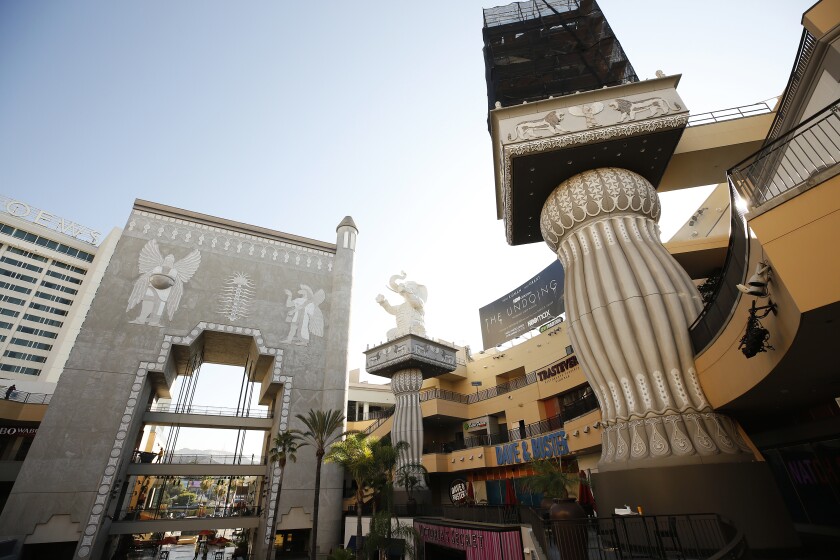Mexico to vote on whether former presidents should be subject to prosecution
Should former Mexican presidents be prosecuted for alleged crimes committed while in office?
That is the question facing voters nationwide Sunday, President Andrés Manuel López Obrador says.
It’s a query of considerable political and moral gravity in a country where de facto impunity has long shielded politicians, especially former chiefs of state, from facing justice for corruption and other misconduct.
Even before a single vote has been cast, the exercise has devolved into a polemical shouting match between the president and his detractors.
López Obrador calls the vote a moral imperative. His critics call it a performative act of political theater and score-settling.
Moreover, the question facing the electorate is cloaked in so many ambiguities that it’s unclear what impact the vote will ultimately have.

Business
The Hollywood & Highland elephants are coming down, a rejection of D.W. Griffith’s racist legacy
The complex is erasing the Babylon-themed homage to D.W. Griffith, director of the racist film “The Birth of a Nation.â€
López Obrador has long championed the referendum â€" technically a consulta, or consultation â€" casting it as a transcendent moment of people power.
“The people must always have the reins of power in their hands,†López Obrador told reporters Friday. “It’s very important that people realize that being in a representative democracy doesn’t mean that you only participate every three or every six years.â€
Few disagree. But his opponents see the vote as a self-righteous ploy meant to exact revenge on longtime political adversaries and deflect attention from López Obrador’s many deficiencies: botching the pandemic response, failing to curb spiraling crime and overseeing a lackluster economy.
Former President Vicente Fox has called the vote a “farce†and urged people not to participate.
“It’s a waste of time,†concurred Arturo MacÃas López, 45, a geography teacher in the capital. “It’s all show ... one more distraction from López Obrador and his terrible governing.â€
In fact, there is no current legal impediment barring prosecution of ex-presidents.
Luis EcheverrÃa, who served as head of state from 1970 to 1976, was accused in 2006 of genocide stemming from a pair of massacres â€" one while he was president, the other when he was national security chief. EcheverrÃa, now 99, was cleared in 2009.
Five other living ex-presidents could theoretically be subject to prosecution â€" as could López Obrador in the future. Posters of the five with red labels emblazoned across their faces reading “Fraud†and “Narco-government†have appeared across the country, though it is unclear who is financing the campaign.
Bombshell allegations tying three ex-presidents to corruption have emerged from Emilio Lozoya, a former chief of Petroleos Mexicanos (Pemex), the state energy behemoth, who was extradited to Mexico from Spain last year on bribery and other charges. But Lozoya’s allegations have yet to yield indictments against former leaders.
Sunday’s election is the latest plebiscite backed by López Obrador since he was elected in 2018 on an anticorruption platform. Other votes have sought citizen input on everything from a new airport to a tourist train megaproject to a new brewery. Turnout has been low, and critics have assailed the process as rigged. But in each instance, massive majorities backed the president’s position, allowing him to assert widespread acclaim for his policies.
Sunday’s vote is different and, at least in theory, more consequential. The task of organizing the vote has fallen not to the presidential loyalists but to the independent National Electoral Institute.
Most who take the trouble to cast ballots in the midst of a third wave of COVID-19 are expected to vote in favor of prosecuting ex-presidents. However, the results will be declared legally binding only if 40% of the country’s 93 million registered voters cast ballots. Turnout may not reach that threshold.
Opposition parties, while not calling for an outright boycott, have denounced the process as a sham and said they won’t participate. And electoral authorities say they have only enough funds to set up about one-third as many voting sites as there were in June’s midterm elections, in which 52% of eligible voters participated.
Then there’s the matter of the ballot question’s hazy wording, drafted in dense legalese by Mexico’s supreme court. The text doesn’t name any former presidents, doesn’t specify alleged crimes and doesn’t mention legal consequences. Rather, the 52-word question asks voters if authorities should begin “a process of clarification of political decisions taken in past years by political actors … to guarantee justice and rights of the possible victims.†Respondents are asked to mark “yes†or “no.â€
The tortured phrasing has drawn comparisons to the twisted verbal gymnastics of Cantinflas, the late Mexican comedian known for his nonsensical discursive riffs, often mocking politicians and other figures of inflated grandiosity.
“Not even Cantinflas could explain this,†columnist Adrián Rueda wrote of the ballot question in Mexico’s Excelsior newspaper. “It’s so ambiguous that one doesn’t understand anything.â€
There is no guarantee that passage will lead to prosecutions. Some say voters’ approval could provide impetus for the creation of a national truth commission to investigate past crimes of state. But that is speculative.
Still, a lot of Mexicans get the point, even if they remain doubtful that any ex-president will ever be seen on trial.
“In this country, corruption and impunity have always ruled,†said Laura Obregón, 67, a retiree in Mexico City who said she plans to vote yes on the ballot question.
Felipe Robledo, 49, one of the capital’s legions of taco vendors, is skeptical. He has no plans to vote. He vowed to offer his product free to all diners if a former Mexican president is carted off to the slammer.
“But that will never happen,†predicted Robledo. “You’ll never see a president in jail in this country, because they are all the same. They all cover up for each other.â€
Sánchez is a special correspondent.

0 Response to "Mexico to vote on whether former presidents should be subject to prosecution"
Post a Comment